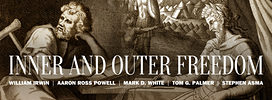My thanks to Mark White and Stephen Asma for continuing the discussion and for drawing our attention more to the family. To begin, I should clarify that my view is not that deep family connections make it impossible to cultivate inner freedom. Rather, they make it difficult, much as it is difficult to stay sober if one spends every waking hour in a bar. But whereas there is probably no good reason to spend every waking hour in a bar if you are trying to stay sober, there is good reason to have deep bonds with family even if you are trying to cultivate inner freedom. Such bonds make a life worth living. Inasmuch as your patience, kindness, and generosity will likely increase as inner freedom increases, you will be a better family member. I very much like White’s formulation that we are “individual in essence and social in orientation.” I will try to apply it in my own way in reacting to Asma’s insights.
In highlighting our connections to family, Asma draws our attention to the Buddhist doctrine of anatman. One way that anatman has been translated is “no self,” and one way of interpreting the doctrine is that there is no separate individual self. Asma rightly points out that in many Asian cultures the concept of the individual is not as robust as in western society. Instead, in many Buddhist societies, identity is highly relational, with a particular emphasis on family relations. In his excellent book Against Fairness, Asma has defended the kind of favoritism and nepotism that predominates in such societies. And in his most recent contribution to this discussion, Asma has pointed to feminist care ethicists as also making a special place for considering one’s relationships in ethical decisionmaking.
I certainly agree with Asma about the importance of relationships, but I am reluctant to agree that much follows from the doctrine of anatman. Anatman is only roughly translated as “no self.” Atman for Hindus is the true individual soul. For the philosophical Hindu, the ultimate insight that leads to enlightenment (moksha) and liberation is that atman is Brahman. The individual soul is one with the universal soul. Therefore, separation is an illusion.
By denying the existence of atman, the Buddha was denying the existence of a soul. He was also denying the existence of something permanent and identical that would make a person the same person across time. To reach nirvana is to extinguish all desire and attachment, including attachment to the notion of atman, a stable and permanent self. Intellectually accepting this Buddhist position is probably very different from having deep insight into it and full acceptance of it. For my part, I have only an intellectual acceptance. Perhaps someone who has deep insight and full acceptance of it would then have a deep sense of connection to all other beings. But I am skeptical.
My best reconstruction of the Buddha’s original teaching is that enlightenment and liberation from suffering is an individual pursuit. Yes, it is done in community (the sangha), but fundamentally it is an individual pursuit done in the encouraging company of others. In this regard, I picture my son running in a cross-country race. The race is for individuals even if they are members of various teams. As White says, we are individual in essence and social in orientation.
There is no doubt that Asma’s interpretation of anatman, which implies connection to others, has been more popular than my favored interpretation, but to me it seems like turning Buddhism back into Hinduism. In any event, if we are to follow this interpretation that stresses the importance of connection to others, on what grounds could we favor family or friends? It would seem they should be no more special than anyone else. If you have no self and they have no self, then creating a sense of a special bond or unity would be misguided. To be clear, though, I think that such bonds are very good things. We are individual in essence and social in orientation.
Returning to the sports analogy, I tend to think of my family as a team—not a loosely associated cross country team but a basketball team. We all need to work together; no one succeeds without the others; and each one’s success is shared by the others. Not all members of the team contribute equally, and that is OK. The family is the place for socialism, because the bonds are so strong and the sense of unity makes an apparent sacrifice no real sacrifice at all. I would like to feel that kind of connection with more people outside my family, and through meditation I try to cultivate loving-kindness (metta). But I am a very long way from achieving it. Because most people are a long way from achieving universal love, I recommend that they focus on the family. If we all took proper care of our families, there would be a lot fewer people in need of help.

